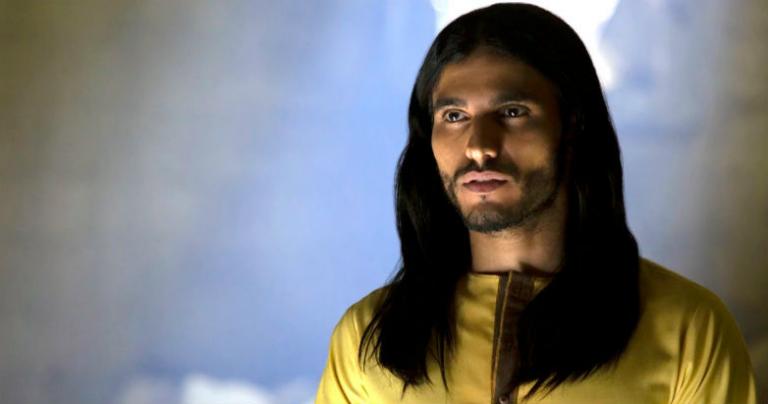
Throughout the day on New Year’s Eve, I rung out 2019 by watching all 10 episodes of Netflix’s Messiah, which started streaming on New Year’s Day. Once again, I watch so you don’t have to.
This is going to be kind of spoiler-y, so if you want to watch Messiah and be pure as the driven snow, go off and come back later.
The show (official site here), executive-produced by Mark Burnett and Roma Downey, is supposed to be about a monumental event — the arrival of a man claiming to be the Second Coming — but it’s fuzzy and contradictory and theologically hazy, and it rolls out in ways that are, while not entirely unimaginative, ultimately utterly predictable.
The alleged messiah — played by Belgian-Tunisian actor Mehdi Debhi — shows up in the Middle East, all liquid dark eyes and sculpted cheekbones (looking rather like the dreamy Jesuses of Burnett and Downey’s The Bible and A.D.: The Bible Continues).
He preaches first to Muslims, leading Syrian followers to the unwelcoming border of Israel. Then he vanishes, only to show up in a border town in Texas, where he preaches to a Baptist minister (John Ortiz), and his wayward daughter (Stefania LaVie Owen).
Along the way, al-Masih, as he is called, attracts the attention of a kinda Jewish CIA officer (Michelle Monaghan) and an agnostic Israeli special-operations officer (Tomer Sisley), and tells them all sorts of unsettling things about their pasts.
He winds up in Washington, D.C., where he tells the LDS U.S. president to withdraw all American troops from around the world, which will somehow bring about world peace (even Jesus didn’t try to give Caesar military advice).
Along the way, his complicated and questionable identity and background are revealed, while he appears to perform actual miracles.
And, his preaching? It’s a pile of New Age-y, peace-and-love, we-are-all-one-family stuff, with no deep theological grounding or specificity. Is he the Messiah? Is he the Antichrist? Is he supernatural, or just a super-good con man? The show says yes to all of these, at one point or another, offering kinda solid evidence that he’s a fraud and kinda solid evidence that he’s not.
The media jackals are there, led by a CNN reporter eager to do the government’s bidding. And, obviously, al-Masih becomes a star on social media — not least because he’s very pretty, extremely cryptic and looks good in a hoodie.
Oh, on a technical note, the languages are all mixed up, with Israeli characters talking to each other in Hebrew, and then, incongruously, in English, while Muslims speak only Arabic; and an Algerian (?) boy speaks to an Israeli stranger in English, when we were just hearing him speak French.
Messiah is everything you might expect in a story about a modern-day savior landing in our media-soaked world, while, in the end, not having very much to do with a recognizable Judeo-Christian God.
One thing you can say about the real Messiah, He wasn’t fuzzy or ambiguous or cryptic or vague. He said what He meant, and He meant what He said. We have no idea if He was pretty or not, but he didn’t seek the limelight by landing in Rome, or try to be all things to all people. And He certainly didn’t wind up in the First Century equivalent of a luxury hotel, working out on the treadmill and presumably enjoying room service (but, to be fair, we never actually see al-Masih eat or drink anything, or take a shower).
Before the series premiered, there was also a controversy about the name al-Masih, which is one Islamic term for Jesus. But, as many outlets pointed out, it could be half of another name.
From Refinery29:
The buzz grew after Netflix shared a trailer for the series and Muslims and Arabic speakers pointed out a giant giveaway about the plot. Al-Masih, which translates to “the messiah,” is a name for Jesus Christ in Islam — but according to the BBC, it also a name associated with Dajjal, a false prophet akin to the Antichrist, who announces himself to the world as al-Masih. In Islamic theology, Dajjal impersonates the true messiah and is often described as having curly hair, being blind in one eye, and sporting the word “kafir” (“unbeliever”) on his forehead.
This may have been intentional or not — as al-Masih does not have curly hair, is not blind in one eye and has no words on his forehead — as the article notes:
But others also pointed out how this could be more than just lazy storytelling, arguing that the move feels ignorant of Islamic theology and shows an obvious pandering to English-speaking, non-Islamic audiences.
A review in The Hollywood Reporter says:
Here, that man is the unnamed figure known as Al-Masih (Mehdi Dehbi) — early reports that the character was named “Al-Masih ad-Dajjal,” a very specific Muslim figure, were completely false.
OK. Whatever.
And there’s a sandstorm in the Syrian desert, a tornado in Texas and flooding in Florida — which are played as if these were unusual, End-Times sorts of things. Give me a sandstorm in Minneapolis, a tornado in the Arctic, and flooding in the Sahara, and we’ll talk.
The only real Christian presence in the show is the Baptist preacher and his family, and the preacher’s father-in-law (Beau Bridges), a predictably rich and smarmy televangelist. The Vatican shows up once, as part of a news report saying that it’s doing an investigation, which has been referred to the Congregation for the Causes of Saints — which, no. Nobody is considered for sainthood if he or she is still alive.
Also, there’s a quote from Oprah, which says, “You become what you believe.” Yup, a show purporting to be about the Second Coming of the Son of God quotes Oprah.
Throughout the whole 10 hours, Messiah is a series of head fakes. Did the CIA agent have an abortion, or does she have cancer, oh, wait, no, it’s something else altogether. Can al-Masih heal illness and raise the dead (maybe, no and apparently yes … maybe). It wants you to doubt, and it wants you to believe … something. It tosses Muslims, Jews, Christians and a Mormon into a big stewpot full of portentous pronouncements and platitudes.
Messiah wants very badly to be profound, but it can’t figure out what its message is, either as a story or as theology. At the end, at least one of the Jewish skeptics has a reason to believe, the Baptist pastor is disillusioned and crushed, and the Muslims — well, a mosque gets blown up.
I suspect the lack of a definitive answer is because the producers want a second season.
The creator of Messiah is Australian writer Michael Petroni, who worked on the TV series Miracles (which I quite liked), and wrote the screenplays for The Book Thief, The Chronicles of Narnia: The Voyage of the Dawn Treader, Queen of the Damned and the excellent exorcism drama The Rite (so he does have some religious cred).
In an interview with News.com.au, he said:
“The show is an invitation for the viewer to make their minds up,” Michael Petroni told news.com.au. “That way you can never really know the central character’s point of view or what his motive is or what he thinks of himself or what he thinks is going on.
“That’s up to the viewer. Until the very last scene of the season, that question is always placed back in the viewer’s lap.
“The show isn’t a singular experience, I think it’s the kind of show that you watch with people or discuss with people after you’ve watched because it’s about what you think. You end up with a mosaic of opinions about this person. The show never tells you what or who he is.”
He’s right about that. The real Messiah didn’t leave folks guessing, but this one does. That’s TV for ya.
Content note: There is some nudity, a bit of sex, lots of violence and plenty of bad language.
Image: Netflix
Don’t miss a thing: Subscribe to all that I write at Authory.com/KateOHare













